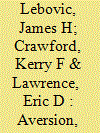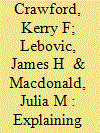|
|
|
Sort Order |
|
|
|
Items / Page
|
|
|
|
|
|
|
| Srl | Item |
| 1 |
ID:
152722


|
|
|
|
|
| Summary/Abstract |
How significant is gender in explaining US public opinion regarding civilian casualties inflicted by the US military during combat and counterterror operations? For answers, we test experimental treatment models on original data obtained from pre-election and post-election surveys conducted as part of the 2014 Cooperative Congressional Election Study. Our evidence supports prior claims that women support military action more reluctantly than men, but, much like men, condition their positions on the accompanying human costs. We find, nonetheless, that women are less likely to support attacks that might bring high numbers of civilian deaths, and, unlike men, base their support on the potential gains from an attack. Indeed, we conclude that differences in support for military action between men and women stem more from the perceived benefits of the attacks than from human costs.
|
|
|
|
|
|
|
|
|
|
|
|
|
|
|
|
| 2 |
ID:
138758


|
|
|
|
|
| Summary/Abstract |
How do we account for the dearth of female contributions to UN peace operations (UNPOs)? For answers, this study examines conditions that led the United Nations to move to reduce the gender imbalance in UNPO personnel and provide these operations. To interpret this evidence, the study presents theoretical explanations for the varying contributions of personnel to NPOs—including the political and socioeconomic character of the contributing states, nternational reputations and norms, and various demand-side influences exerted by missions—and then tests these explanations with a cross-sectional time-series model that accounts for female personnel contributions to each mission in the 2010–2011 period. Although offering significant support for domestic political explanations, the findings indicate that
gender diversity is not a primary goal of most contributors and is largely a by-product of force sizes.
|
|
|
|
|
|
|
|
|
|
|
|
|
|
|
|
|
|
|
|
|